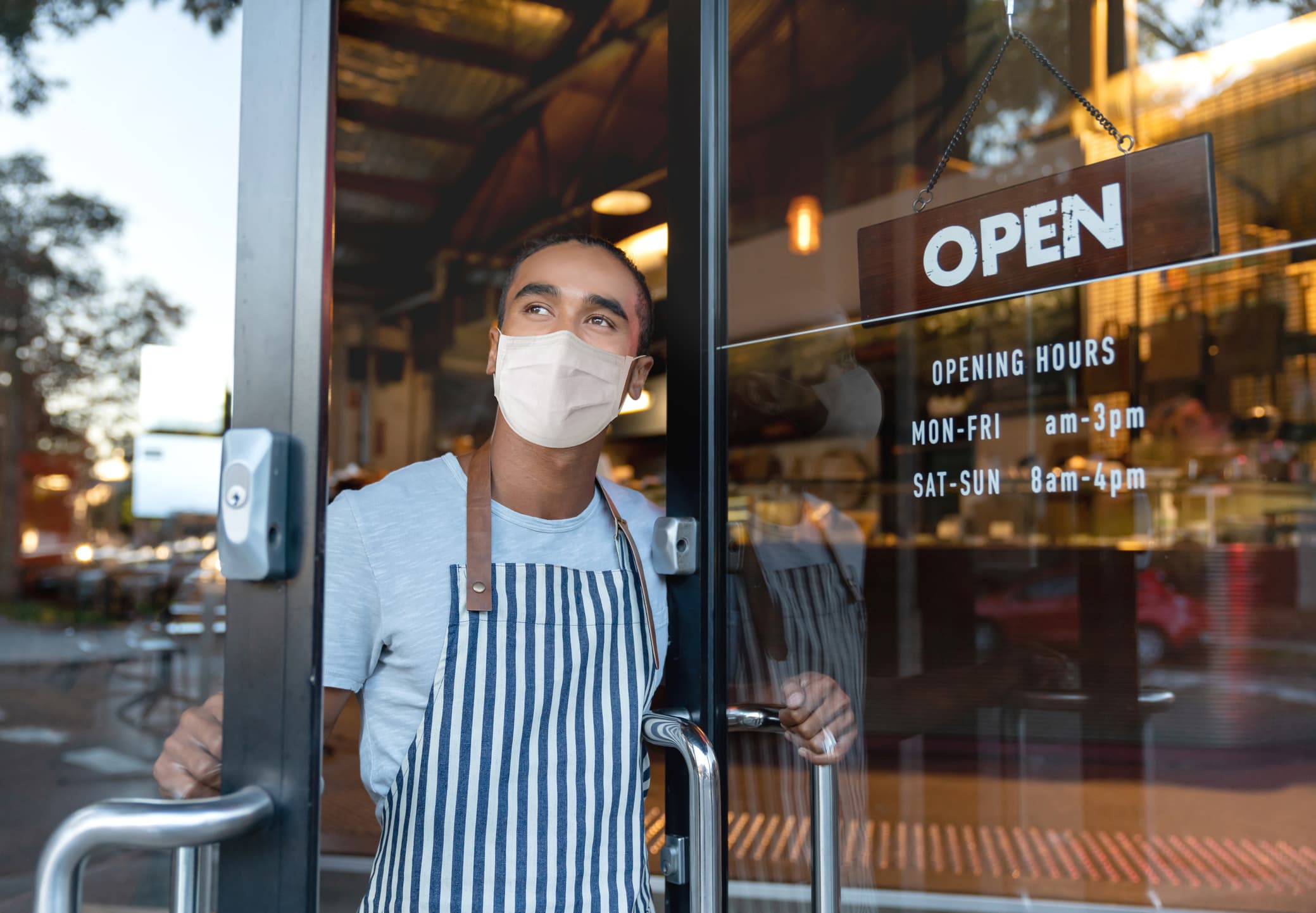Almost two years into the Covid-19 pandemic, many small businesses are still struggling.
While financial assistance for those impacted by the crisis has ended, some of the hardest hit industries, including gyms, hotels and restaurants, are pushing for more relief. For many, the omicron surge dealt a big blow.
In the restaurant industry, 88% of operators experienced a decline in consumer demand for indoor on-premises dining because of the variant, according to a survey by the National Restaurant Association. Three-quarters said business conditions were worse now than three months ago, and 74% reported their restaurant is less profitable now than it was before the pandemic.
“The restaurant industry is in this situation not because of financial waste or mismanagement on our part,” said Sean Kennedy, executive vice president for public affairs at the National Restaurant Association.
More from Invest in You:
Meet three entrepreneurs who quit jobs to start their own businesses
Small business owners are optimistic, but still face challenges ahead
The Great Reshuffle: Companies reinvent rules as workers seek flexibility
“We are in this position because of a national emergency, a pandemic, that needs a national response.”
To be sure, there was a response after Covid devastated the economy. The Small Business Administration rolled out forgivable loans through the Paycheck Protection Program and aid through its Economic Injury Disaster Loan program.
Grants for the live entertainment and arts industry were given through the Shuttered Venue Operators Grant Program, while restaurant operators received grants through the Restaurant Revitalization Fund. The latter saved more than 900,000 jobs and helped 96% of the recipients stay in business, Kennedy said.
Yet it wasn’t enough, he argued. The fund had $28.6 billion, which was paid to recipients, but there’s about another $48 billion in pending applications that missed out.
Nearly 50% of restaurant owners who didn’t receive revitalization grants think it’s unlikely they will stay in business beyond the pandemic without help, the association’s survey found. The National Restaurant Association Research Group polled 4,200 restaurant operators Jan. 16-18.
Restaurants typically have profit margins of 3% to 5%, but need to run at full capacity to hit that, Kennedy explained. Not only has there been decreased consumer traffic thanks to omicron, operators are facing worker shortages, which may prohibit them from operating fully, and higher costs due to inflation.
“When you take all of these things and put them together, you really have a perfect storm for a business that is marginally profitable in the best of times,” Kennedy said.
Stephen Hightower, managing partner of City Group Hospitality, is weathering that storm right now.
The restaurant group, which has several locations in Baton Rouge, Louisiana, quickly pivoted when the pandemic hit. It provided take-out service and got into the school lunch business.
It also secured a forgivable PPP loan. However, City Group Hospitality never received a revitalization grant, despite applying within 10 minutes of the portal opening, Hightower said.
Yet the company survived and even felt optimistic enough to add a couple more locations. Then, the delta variant hit, followed by omicron. Costs continued to rise and workers were hard to find. If there isn’t any relief, Hightower said he will have to figure out where to start making cuts.
“We can’t continue to raise prices on our guests to make them at levels that are unattractive,” he said.
They have supporters in Congress. Sen. Ben Cardin, D-Md., and Sen. Roger Wicker, D-Miss., are currently working to build bipartisan support for replenishment of the Restaurant Revitalization Fund.
Several Democratic House members also sent a letter to President Joe Biden earlier this week calling for more targeted relief for small businesses, including reopening the fund and the Shuttered Venue Operators Grants. Additionally, they asked for other at-risk sectors centered on in-person gatherings be made eligible for federal assistance, such as the fitness and travel industries and businesses that offer group activities and indoor recreation.
The biggest fear if there is another Covid wave, is it will reshape the restaurant industry forever.Stephen Hightowermanaging partner of City Group Hospitality
“For restaurants, live event venues, travel companies, gyms, and other small businesses centered on in-person gatherings, the massive increase in Covid-19 cases over the past two months has led to a large decline in consumer demand,” the letter stated.
The fate of any relief is unclear and is sure to find opposition from fiscal conservatives, who will argue that much has been spent already. In fact, Sen. Rand Paul, R-Ky., argues that the Covid stimulus spending is to blame for rising inflation.
“Congress needs to realize that further spending at this time of rapidly rising prices is only going to continue the trend of rising prices on this nation’s already vulnerable businesses and families,” Paul said in a statement.
Yet proponents of the aid argue that small businesses are vital to the American economy.
There were 31.7 million small businesses in the U.S. as of October, according to the U.S. Small Business Administration, or 99.9% of all firms. Eighty-one percent of small businesses have no paid employees while 19%, or 6 million firms, do.
“The biggest fear if there is another Covid wave, is it will reshape the restaurant industry forever,” Hightower said.
“That’s why the funding is vitally important — to set the stage for the future of the industry, to come out stronger and utilize everything we’ve learned in the past year.”
SIGN UP: Money 101 is an 8-week learning course to financial freedom, delivered weekly to your inbox. For the Spanish version Dinero 101, click here.
CHECK OUT: My online side hustle can bring in $12,000/month: Here are my top tips for scaling up and earning more with Acorns+CNBC
Disclosure: NBCUniversal and Comcast Ventures are investors in Acorns.
